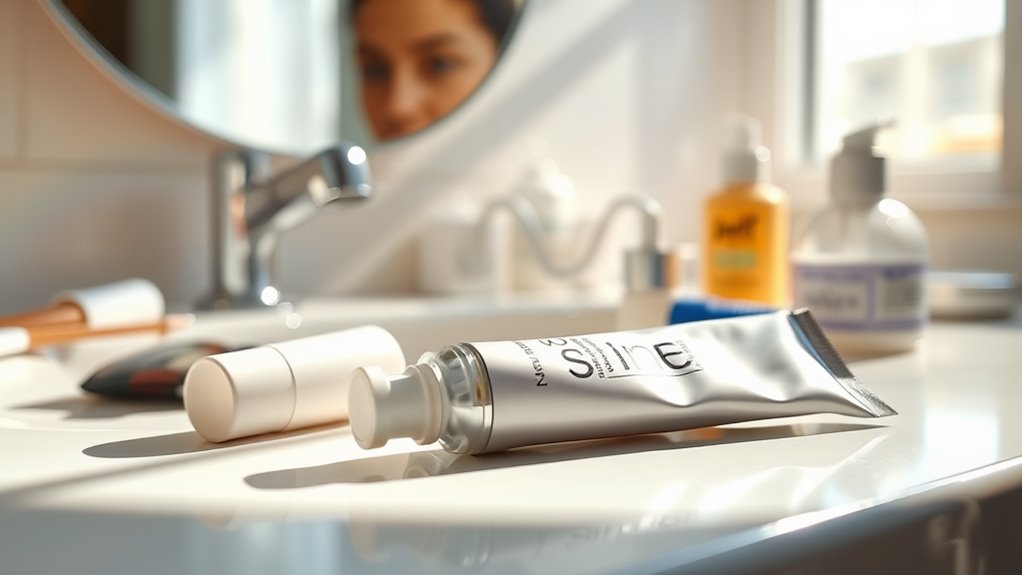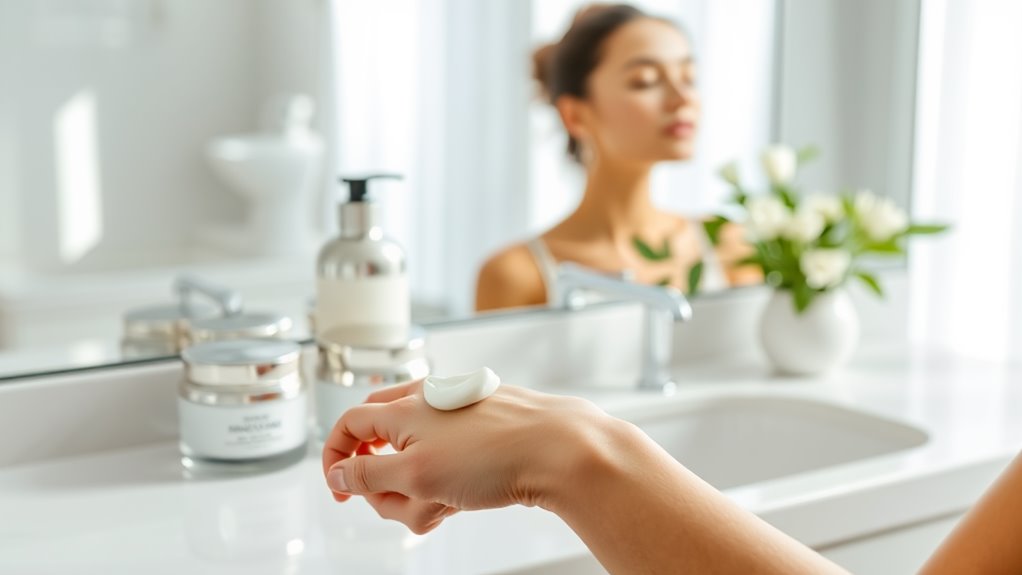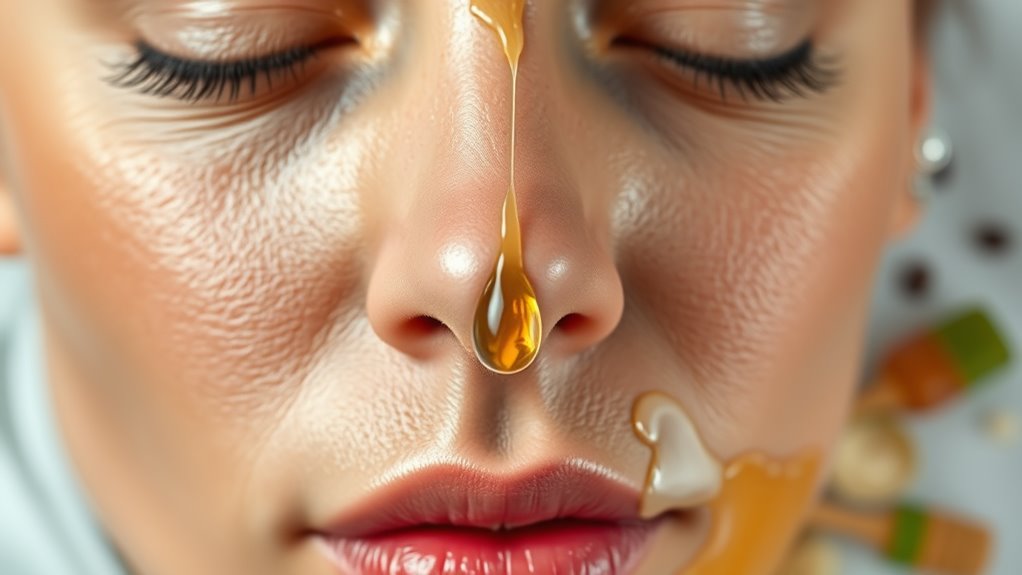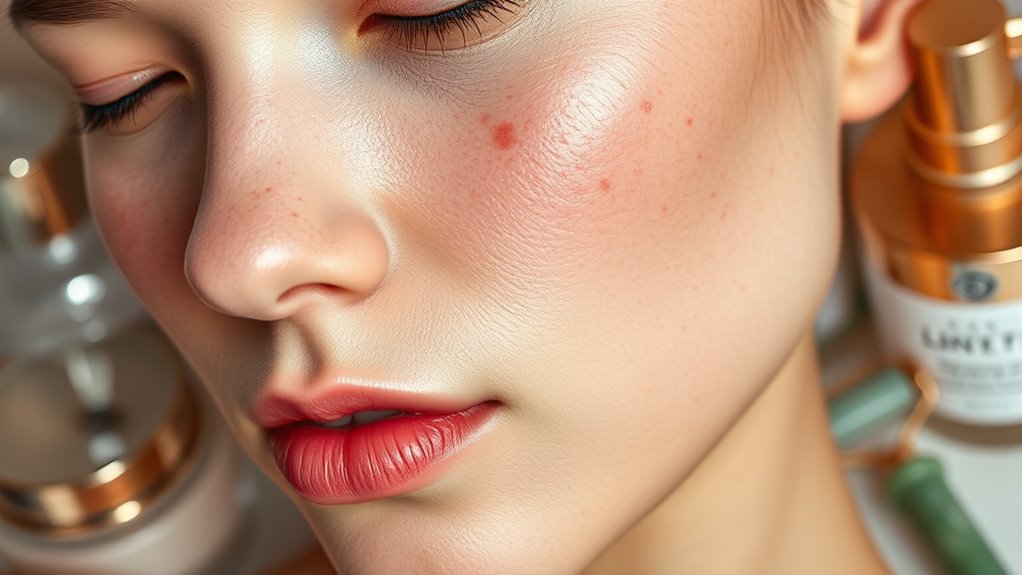This One Mistake Could Be Why Your Acne Keeps Coming Back
One major mistake that could be causing your recurring acne is failing to establish a consistent skincare routine tailored to your unique skin type. Neglecting to understand your skin’s specific needs can lead to the use of ineffective products, which may exacerbate breakouts rather than control them. Daily cleansing and moisturizing, along with identifying and avoiding pitfalls, play a critical role in acne management. Discovering how to develop an effective plan can further enhance your skin’s health.
Key Takeaways
- Over-cleansing or using harsh products can strip essential oils, leading to irritation and increased breakouts.
- Failing to identify your skin type may result in using unsuitable products that exacerbate acne.
- Ignoring the role of diet, particularly high sugar and dairy intake, can contribute to persistent acne.
- Stress management is crucial; elevated cortisol levels can worsen oil production and skin inflammation.
- Inconsistent skincare routines may prevent effective treatment, allowing acne to return repeatedly.
Understanding Acne: The Basics
Acne is a common skin condition that affects millions of people, particularly during adolescence. To understand acne effectively, you must recognize that it involves the clogging of hair follicles due to excess oil, dead skin cells, and bacteria. This process leads to inflammation, resulting in the various types of acne lesions. One crucial acne skincare mistake many make is over-cleansing or using harsh products, which can strip your skin of essential oils and provoke further breakouts. Instead, focus on a balanced skincare routine that includes gentle cleansers, non-comedogenic moisturizers, and targeted treatments. Additionally, avoiding this cleansing mistake can significantly improve your chances of achieving clearer skin.
Common Myths About Acne
You might believe that certain foods or environmental factors directly cause acne, but many common myths persist.
For instance, while chocolate is often blamed, research shows there’s little evidence linking it to breakouts.
Additionally, drying out oily skin or relying solely on sunlight for treatment can actually exacerbate the condition rather than improve it. In fact, habits that worsen acne can include using harsh cleansers or neglecting to moisturize, which may lead to increased irritation and breakouts.
Chocolate Causes Acne
Many people believe that indulging in chocolate can directly lead to breakouts, but scientific evidence doesn’t support this claim. While individual reactions may vary, several factors are more influential in acne development:
-
Hormonal Fluctuations: Changes in hormone levels can trigger increased oil production, leading to clogged pores.
-
Dietary Patterns: A diet high in refined sugars and dairy may exacerbate acne for some individuals.
-
Skin Care Regimen: Using non-comedogenic products and maintaining a consistent skincare routine is crucial for acne management.
In essence, chocolate itself isn’t the culprit. Instead, focus on a holistic approach to skincare and diet, addressing the real factors that contribute to acne.
Understanding these elements can empower you to make informed choices.
Oily Skin Needs Drying
Oily skin doesn’t necessarily mean it needs to be stripped of moisture. In fact, over-drying your skin can trigger a rebound effect, leading to increased oil production. This cycle often exacerbates acne rather than alleviating it.
Your skin requires a balanced approach; using products that maintain hydration while controlling excess oil is key. Ingredients like salicylic acid can help unclog pores without over-drying, while hyaluronic acid maintains moisture levels.
It’s crucial to recognize that oily skin is often a sign of dehydration, not just excess sebum. By adopting a balanced skincare regimen, you can achieve clarity and reduce breakouts effectively.
Sunlight Clears Breakouts
While sunlight might seem like a natural solution for clearing breakouts, relying on sun exposure can be misleading and harmful. Here are three reasons why:
-
UV Damage: Prolonged sun exposure can cause skin damage, increasing inflammation and worsening acne in the long run.
-
Dehydration: Sunlight can dry out your skin, leading to an overproduction of oil, which may trigger more breakouts.
-
Hyperpigmentation: Sun exposure can darken acne scars, making them more noticeable and prolonging their appearance.
Understanding these factors is crucial. Rather than depending on sunlight, focus on scientifically backed treatments like topical retinoids or salicylic acid.
Prioritize a consistent skincare routine and consult a dermatologist for tailored solutions to achieve lasting results.
The Importance of a Consistent Skincare Routine
A consistent skincare routine is essential for managing acne effectively.
Daily cleansing removes dirt, oil, and impurities, preventing breakouts and maintaining skin health.
Additionally, moisturizing helps balance your skin’s hydration, which is crucial for preventing excess oil production and irritation. Regularly reassessing your routine can also help identify common reasons why it may not be delivering the desired results.
Daily Cleansing Importance
Establishing a daily cleansing routine is crucial for maintaining healthy skin, especially when combating acne. Consistent cleansing removes excess oil, dirt, and dead skin cells, which can clog pores and exacerbate breakouts.
To effectively manage your acne, consider these three essential cleansing principles:
-
Frequency: Cleanse your skin at least twice daily to prevent the buildup of impurities.
-
Product Selection: Choose a gentle, non-comedogenic cleanser tailored to your skin type. Avoid harsh ingredients that can irritate and worsen acne.
-
Technique: Use a light touch and circular motions to ensure thorough yet gentle cleansing, promoting circulation and skin health.
Moisturizing for Balance
Moisturizing is essential for maintaining skin balance, especially when you’re managing acne. When you strip your skin of moisture through harsh treatments, it can overcompensate by producing excess oil, leading to clogged pores and more breakouts.
A consistent moisturizing routine helps to reinforce your skin’s barrier, preventing irritation and promoting healing. Look for non-comedogenic moisturizers that hydrate without clogging pores. Ingredients like hyaluronic acid and glycerin are beneficial, attracting moisture without adding excess oil.
Applying moisturizer after cleansing and treatment ensures your skin remains hydrated and balanced. Remember, consistency is key; integrating this step daily can significantly impact your skin’s health.
Mastering this aspect of skincare can effectively reduce the recurrence of acne and improve overall skin texture.
Identifying Your Skin Type
How can you effectively identify your skin type to better manage acne? Understanding your skin type is crucial for tailored treatment. Here’s how to classify your skin:
-
Oily: If your skin appears shiny, especially in the T-zone, and you notice enlarged pores, you likely have oily skin.
-
Dry: Skin that feels tight, looks flaky, or has rough patches indicates dryness. You might also experience itchiness or redness.
-
Combination: If you have both oily areas (like the forehead) and dry patches (like the cheeks), your skin is combination. This type of skin can be particularly tricky to manage, as it requires balancing combination skin to ensure both dryness and oiliness are addressed.
Once you identify your skin type, you can select appropriate products and treatments, minimizing the risk of exacerbating acne and promoting overall skin health.
The Role of Diet in Acne Management
Your diet plays a crucial role in managing acne, as certain foods can trigger breakouts. Research shows a significant link between high sugar intake and increased acne severity, while dairy products may also exacerbate skin issues for some individuals. Incorporating healthy fats, like those found in avocados and nuts, can promote skin health and aid in acne management. Additionally, avoiding high glycemic foods can further help reduce the frequency and severity of breakouts.
Sugar and Acne Link
While the connection between diet and skin health has gained increasing attention, the link between sugar intake and acne severity remains particularly significant.
High sugar consumption can exacerbate acne through several mechanisms, including:
-
Insulin Spikes: Excessive sugar leads to elevated insulin levels, which can increase oil production in the skin.
-
Inflammatory Response: Sugar promotes inflammation, worsening existing acne or triggering new breakouts.
-
Glycation: Sugars interact with proteins in the body, forming advanced glycation end products (AGEs) that can damage skin and accelerate aging.
Dairy’s Impact on Skin
As you consider dietary factors affecting acne, dairy products often emerge as a significant player. Research indicates that dairy, particularly skim milk, may exacerbate acne due to its hormonal content and insulin-like growth factor (IGF-1).
These compounds can stimulate sebum production and promote inflammation, creating an environment conducive to acne development. Additionally, some individuals may experience heightened sensitivity to dairy, resulting in inflammatory responses that further aggravate skin conditions.
While not everyone will react to dairy the same way, eliminating or reducing dairy intake can be a valuable strategy for some in managing acne. Monitoring your skin’s response to dietary changes is essential for developing a tailored approach to acne management.
Healthy Fats Benefits
Incorporating healthy fats into your diet can significantly influence acne management by promoting skin health and reducing inflammation.
These beneficial fats support cellular function and help maintain skin barrier integrity, which is crucial for preventing breakouts.
Here are three ways healthy fats can help:
-
Omega-3 Fatty Acids: Found in fish, flaxseeds, and walnuts, these reduce inflammation and can decrease acne severity.
-
Monounsaturated Fats: Present in olive oil and avocados, they nourish skin and improve hydration, leading to better overall skin appearance.
-
Antioxidant-Rich Fats: Sources like nuts and seeds protect skin from oxidative stress, further supporting healing and clarity.
Overusing Products: A Common Pitfall
Overusing acne products can lead to aggravated skin conditions rather than the desired improvement. Many individuals mistakenly believe that more product means better results, but this often results in irritation and breakouts. Understanding the right balance is crucial in your skincare regimen.
| Product Type | Effects of Overuse | Recommended Usage |
|---|---|---|
| Exfoliants | Redness, peeling | 1-2 times per week |
| Benzoyl Peroxide | Dryness, irritation | As directed |
| Salicylic Acid | Over-exfoliation, sensitivity | 2-3 times per week |
| Moisturizers | Clogged pores, greasiness | Daily, as needed |
The Impact of Stress on Skin Health
When stress levels rise, your skin often bears the brunt of it, leading to various issues, including acne flare-ups.
Stress triggers the release of cortisol, which can increase oil production and inflammation in your skin.
To manage stress effectively and improve your skin health, consider these strategies:
-
Mindfulness Practices: Engage in meditation or deep-breathing exercises to reduce stress.
-
Regular Exercise: Physical activity can lower cortisol levels and improve overall skin health.
-
Adequate Sleep: Prioritize sleep to allow your body to repair and rejuvenate, including your skin.
The Significance of Regularly Changing Pillowcases
Although you may not realize it, regularly changing your pillowcases plays a crucial role in maintaining clear skin. Your pillowcase can harbor bacteria, oils, and dead skin cells that exacerbate acne. By replacing it frequently, you reduce the transfer of these impurities to your face.
| Frequency of Change | Benefits |
|---|---|
| Every 2-3 days | Minimizes bacterial buildup |
| Weekly | Reduces oil accumulation |
| Bi-weekly | Prevents skin irritation |
Prioritizing clean pillowcases can significantly impact your skin health. In doing so, you create a cleaner environment that supports your skin’s natural healing processes, which ultimately aids in reducing breakouts and achieving clearer skin.
The Dangers of Picking at Acne
Picking at acne may seem like a quick solution to clear your skin, but it can lead to significant complications. The act of squeezing or picking can introduce bacteria and exacerbate inflammation, ultimately worsening your condition.
Here are some dangers to consider:
-
Infection: Open wounds from picking can become breeding grounds for bacteria, leading to further breakouts.
-
Scarring: Manipulating acne can damage skin tissue, resulting in permanent scars that are difficult to treat.
-
Inflammation: Picking can trigger a heightened inflammatory response, making existing acne worse and prolonging healing time.
Instead of picking, focus on effective treatment methods to promote healing and prevent future breakouts.
Prioritizing your skin’s health will yield far better results than impulsively picking at blemishes.
The Benefits of Seeking Professional Help
Seeking professional help for acne can significantly enhance your skin’s health and overall appearance.
Dermatologists possess in-depth knowledge of skin biology, enabling them to accurately diagnose the underlying causes of your acne. This expertise allows for targeted treatment strategies that over-the-counter products often can’t provide.
By utilizing prescription medications, advanced therapies, and tailored skincare regimens, you’ll likely see more effective results. Moreover, professionals can monitor your progress and adjust treatments as needed, ensuring optimal skin health.
Additionally, they can educate you on proper skincare techniques and lifestyle modifications to prevent future breakouts. Ultimately, seeking expert guidance empowers you with the tools and knowledge necessary for achieving and maintaining clear skin.
Don’t underestimate the value of professional insight in your acne management journey.
Developing a Personalized Acne Treatment Plan
Creating a personalized acne treatment plan is vital for effectively managing your skin condition. A tailored approach considers your unique skin type, lifestyle, and triggers.
Here are three essential steps to develop your plan:
-
Consult a Dermatologist: Get professional advice to identify the root causes of your acne and receive customized recommendations.
-
Assess Your Products: Use non-comedogenic products suited for your skin type, avoiding harsh ingredients that may exacerbate irritation.
-
Monitor Your Progress: Keep a journal to track changes in your skin’s condition, adjusting your routine as necessary.




